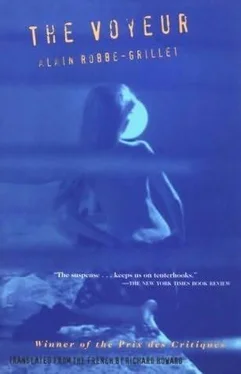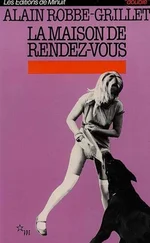The woman put down her towel; she seized the coffee mill beside her, sat down on a stool, and began to turn the handle vigorously. In order not to tire either arm at such a speed, she ground the coffee with one arm and then the other alternately.
The coffee beans made a pattering noise as they were crushed in the gearing, and when one of the two men said something to his companion Mathias could not hear him clearly. Several syllables, however,’ took shape in his mind, resembling the word “cliff” and—less positively—the verb “to bind.” He cocked his ears; but no one was speaking any longer.
The salesman found it strange that they had fallen silent in this way ever since he had come in, sipping their apéritifs and putting their glasses on the bar after each swallow. Perhaps he had disturbed them in the midst of an important conversation? He tried to imagine what it could be about. But suddenly he was afraid to guess, and dreaded the possibility that the subject might be broached again, as if their words, without their knowing it, might have concerned him. It would not be difficult to go a good deal further along this irrational course: the words “without their knowing it,” for instance, were superfluous, for if his presence had caused them to fall silent—although they were not embarrassed to speak in front of the proprietress—it was obviously because they… because “he”… “In front of the proprietress,” or rather, “with” her. And now they were pretending not to know one another. The woman stopped grinding only to refill the coffee mill. The workmen managed to keep another mouthful at the bottoms of their glasses. To all intents and purposes no one had anything to say; yet five minutes before he had seen through the window all three talking animatedly together.
The proprietress was about to pour another drink for the two men; they were wearing blue overalls, like most of the lighthouse workers. Mathias leaned his bicycle against the shop¬window, pushed open the glass door, stood against the bar next to the two workmen and ordered an apéritif. After having served him, the woman began grinding coffee. She was middle-aged, fat, imposing, self-assured. At this time of day there was no sailor in her establishment. The house in which her café was located had no upper floor. The sparkling water of the harbor could not be seen through the door.
Evidently no one had anything to say. The salesman turned toward the room. For a moment he was afraid it was all going to begin over again: three fishermen he had not noticed when he came in—a very young man and two older ones—were sitting over three glasses of red wine at one of the back tables; just then the youngest began speaking—but the noise of the coffee mill might have kept Mathias from hearing the beginning of the conversation. He cocked his ears. As usual, it was about the slump in crab sales. He turned back to the bar to finish this unidentifiable reddish drink.
His eyes met those of the proprietress; she had been watching him on the sly as she ground her coffee, while he himself had been looking in the other direction. He lowered his eyes to his glass, as if he had noticed nothing. To his left the two workmen were looking straight ahead, toward the bottles lined up on the shelf.
“You wouldn’t happen to be the man selling watches?” the woman asked suddenly, her voice calm.
He lifted his head. She was still turning the handle of her coffee mill, still staring at him—but kindly, he thought.
“Yes, I am,” answered Mathias. “Someone must have told you a salesman was coming this way. News travels fast around here!”
“Maria, one of the Leduc girls, came in here just ahead of you. She was looking for her sister, the youngest one. You visited them this morning: the last house as you leave town.”
“Yes, of course I visited Madame Leduc. Her brother is a friend of mine—Joseph—the one who works for the steamship line. But I haven’t seen the girls today, not one of them. No one told me the youngest was here.”
“She wasn’t. Her mother sent her to tend the sheep. And she ran away again. Always running off where she shouldn’t, making trouble somewhere.”
“They send her as far as this with the sheep?”
“No, of course not: back there, under the crossroads. Maria went to tell her to come home early, but no one was there—only the sheep. The girl had picketed them in a hollow.”
Mathias shrugged, hesitating between amusement and compassion. The proprietress didn’t take the matter too much to heart, but on the other hand she wasn’t laughing either; her expression was completely neutral—certain of what she was talking about, yet attaching no importance to it—a vaguely professional smile on her lips, as if she were merely talking about the weather.
“It sounds as if she’s something of a problem,” the salesman said.
“A real devil! Her sister came all the way here on her bicycle to see if anyone knew where she was. If she doesn’t take her home with her, there’s going to be trouble.”
“Children are a lot of trouble,” said the salesman.
They were obliged to speak very loudly, in order to be heard over the noise of the coffee mill. Between sentences, the pattering noise of the coffee beans as they were crushed in the gearing was all that could be heard. To reach the village at Black Rocks, Maria must have passed Mathias on the road while he was visiting the exhausted-looking couple. Before that, to cross the moor between the road and the place where the sheep were grazing on top of the cliff, she couldn’t have taken the same path he used, but a short cut probably, a short cut starting at the crossroads. In fact, the girl needed a certain amount of time to make the trip from the road to the cliff top and back and to look around a little as well. This amount of time would be much more than the few minutes it had taken the salesman to sell the one watch in the only house he had stopped at between the fork to the Marek farm and the village. And the distance between this fork and the cottage in question could not account for the difference either: beside the fact that it was scarcely more than five or six hundred yards, it was still the road both of them must have taken.
Thus Maria was already riding toward the cliff before he himself had climbed back onto his own bicycle. Consequently, if she had taken the path opposite the fork to the Marek farm, she would have come upon the salesman in the middle of the road, gossiping with the old woman—or examining his bicycle chain, the clouds, the dead toad—for this prolonged stop had occurred within sight of the crossing—not two steps away from it, so to speak. (This same hypothesis—in which the girl used the same path Mathias had taken, to reach the cliff top—worked no better if presuming she had arrived at the cliff top before he had made his stop, since then she would have encountered the salesman on the path itself. )
She must have come by another road. But why had she mentioned him to the proprietress? Because of the rolling ground, it seemed unlikely—it was impossible—it was impossible—it was impossible that she had seen him from another path, supposing that she had been going toward the cliff top and he returning from it. Back there, in the sheltered hollow where the sheep were grazing, she had doubtless just missed him. After a rapid exploration of the environs, repeated calls, a few seconds’ hesitation, she had returned to the main road—this time, probably, by the same path he had taken (the only one he knew), but the tire tracks were too numerous and too indistinct to be able to tell one from another. It seemed unlikely that there would be a new short cut between the sheep and the village at Black Rocks—not a very useful short cut in any case, given the size of the bay jutting into the land northwest of the lighthouse.
Читать дальше












